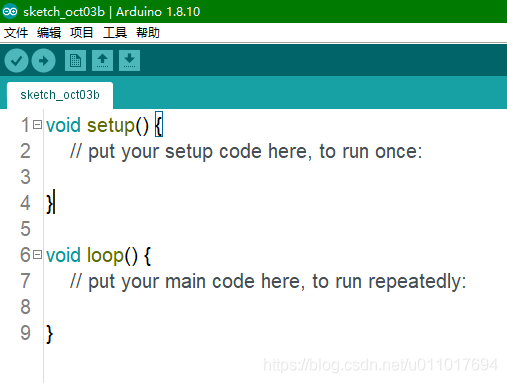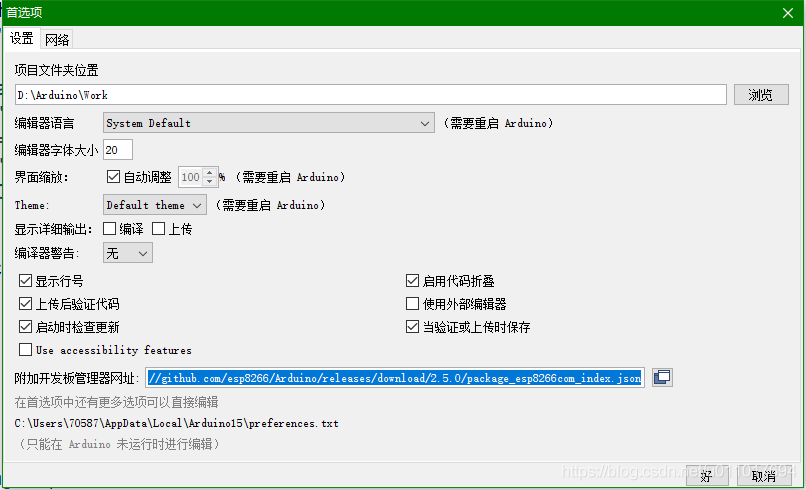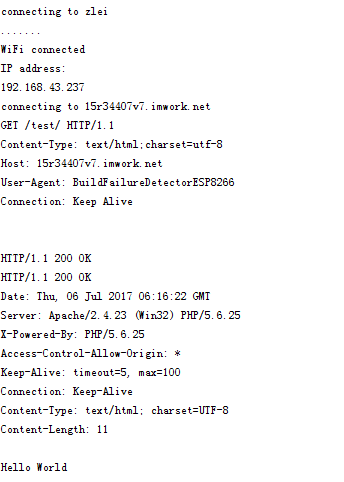使用Arduino UNO的看门狗:
介绍:看门狗定时器用避免电子设备出现故障造成死机,例如死循环。为此,看门狗作为一个物理定时器,在程序运行时不断的增加,并驱动一个中断, 如果达到某一个设定的值,就会复位微处理器。在正常操作下,定时器在程序流程中的定期设置为0, 但如果代码进入死循环,定时器复位不会发生,看门狗触发中断并重新启动。
使用看门狗防止死机:Arduino为用户提供了方便操作的函数和宏,可以直接引入库:
#include <avr/wdt.h>这个函数库提供了三个API函数供我们使用:
wdt_enable(timeout) //看门狗使能并设置超时时间
wdt_disable() //关闭wdt_reset() //复位timeout可以使用wdt.h文件中定义的宏常量,也可以自定义时间;
通常情况下,需要在setup()函数中使能看门狗定时器,并在loop()中不断的喂狗防止溢出,官方给出的示例代码如下:
#include <avr/wdt.h>
void setup()
{
pinMode(13,OUTPUT);
wdt_enable(WDTO_2S); //开启看门狗,并设置溢出时间为两秒
}
void loop()
{
digitalWrite(13,HIGH);
delay(100);
digitalWrite(13,LOW);
delay(100);
wdt_reset(); //喂狗操作,使看门狗定时器复位
}注:看门狗也可以唤醒省电模式下的 Arduino, 详细说明可查阅官方文档,特别指出的是,如果使用POWER_MODE_IDLE模式(UART、SPI、timer等处于工作状态),需在进入休眠状态前关闭看门狗功能,休眠结束之后再次启动,否则几秒之后看门狗会强制重启Aruino, 休眠失败。示例代码:
/* Sleep Demo Serial
* -----------------
* Example code to demonstrate the sleep functions in a Arduino. Arduino will wake up
* when new data is received in the serial port USART
* Based on Sleep Demo Serial from http://www.arduino.cc/playground/Learning/ArduinoSleepCode
*
* Copyright © 2006 MacSimski 2006-12-30
* Copyright © 2007 D. Cuartielles 2007-07-08 - Mexico DF
*
* With modifications from Ruben Laguna 2008-10-15
*
* This program is free software: you can redistribute it and/or modify
* it under the terms of the GNU General Public License as published by
* the Free Software Foundation, either version 3 of the License, or
* (at your option) any later version.
*
* This program is distributed in the hope that it will be useful,
* but WITHOUT ANY WARRANTY; without even the implied warranty of
* MERCHANTABILITY or FITNESS FOR A PARTICULAR PURPOSE. See the
* GNU General Public License for more details.
*
* You should have received a copy of the GNU General Public License
* along with this program. If not, see <http://www.gnu.org/licenses/>.
*
*/
#include <avr/power.h>
#include <avr/sleep.h>
int sleepStatus = 0; // variable to store a request for sleep
int count = 0; // counter
void setup()
{
Serial.begin(9600);
}
void sleepNow()
{
/* Now is the time to set the sleep mode. In the Atmega8 datasheet
* http://www.atmel.com/dyn/resources/prod_documents/doc2486.pdf on page 35
* there is a list of sleep modes which explains which clocks and
* wake up sources are available in which sleep modus.
*
* In the avr/sleep.h file, the call names of these sleep modus are to be found:
*
* The 5 different modes are:
* SLEEP_MODE_IDLE -the least power savings
* SLEEP_MODE_ADC
* SLEEP_MODE_PWR_SAVE
* SLEEP_MODE_STANDBY
* SLEEP_MODE_PWR_DOWN -the most power savings
*
* the power reduction management <avr/power.h> is described in
* http://www.nongnu.org/avr-libc/user-manual/group_avr_power.html
*/
set_sleep_mode(SLEEP_MODE_IDLE); // sleep mode is set here
sleep_enable(); // enables the sleep bit in the mcucr register
// so sleep is possible. just a safety pin
power_adc_disable();
power_spi_disable();
power_timer0_disable();
power_timer1_disable();
power_timer2_disable();
power_twi_disable();
wdt_disable(); //close wdt before Arduino enter sleep mode
sleep_mode(); // here the device is actually put to sleep!!
// THE PROGRAM CONTINUES FROM HERE AFTER WAKING UP
sleep_disable(); // first thing after waking from sleep:
// disable sleep...
wdt_enable(timeout); //open wdt after wakine from sleep
power_all_enable();
}
void loop()
{
// display information about the counter
Serial.print("Awake for ");
Serial.print(count);
Serial.println("sec");
count++;
delay(1000); // waits for a second
// compute the serial input
if (Serial.available()) {
int val = Serial.read();
if (val 'S') {
Serial.println("Serial: Entering Sleep mode");
delay(100); // this delay is needed, the sleep
//function will provoke a Serial error otherwise!!
count = 0;
sleepNow(); // sleep function called here
}
if (val 'A') {
Serial.println("Hola Caracola"); // classic dummy message
}
}
// check if it should go asleep because of time
if (count >= 10) {
Serial.println("Timer: Entering Sleep mode");
delay(100); // this delay is needed, the sleep
//function will provoke a Serial error otherwise!!
count = 0;
sleepNow(); // sleep function called here
}
}








